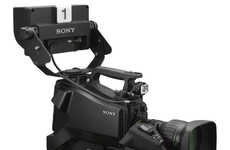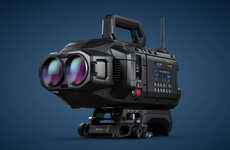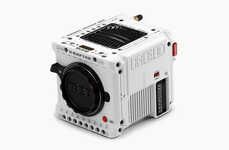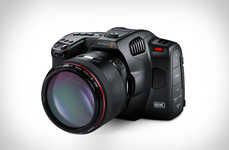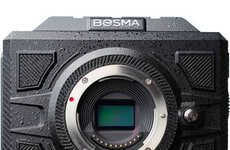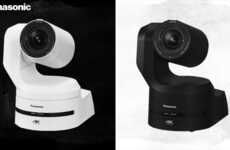
Blackmagic Studio Camera is the World's Smallest Broadcast Camera
Megan Facciuolo — April 17, 2014 — Tech
References: blackmagicdesign & thecoolist
Broadcasting cameras are extremely bulky and they sometimes need a whole crew to move them around a studio. However, the Blackmagic Studio Camera is the exception; the sleek camera is dubbed as the world’s smallest advanced broadcast camera.
This camera packs a lot of power, but still remains impeccably lightweight. Its lightness can be attributed to its magnesium alloy body and contains phantom-powered microphone, optical fiber and SDI connections. The camera itself is of equally high-quality and despite its size, it is claimed as one of the best cameras on the market. And on top of all that, the camera comes equipped with a sunshade and a flexible MFT lens mount.
Blackmagic is bound to change broadcasting dynamics world-wide -- or at least give camera operators a break from all the heavy-lifting they do.
This camera packs a lot of power, but still remains impeccably lightweight. Its lightness can be attributed to its magnesium alloy body and contains phantom-powered microphone, optical fiber and SDI connections. The camera itself is of equally high-quality and despite its size, it is claimed as one of the best cameras on the market. And on top of all that, the camera comes equipped with a sunshade and a flexible MFT lens mount.
Blackmagic is bound to change broadcasting dynamics world-wide -- or at least give camera operators a break from all the heavy-lifting they do.
Trend Themes
1. Miniaturized Broadcasting Cameras - The trend of developing ultra-sleek cameras with advanced broadcasting capabilities, providing a portable and lightweight solution for camera operators.
2. Lightweight Camera Equipment - The trend of using magnesium alloy bodies and other lightweight materials to create broadcasting cameras that are easier to handle and transport, improving efficiency and reducing physical strain.
3. Integrated Camera Technology - The trend of integrating advanced features like phantom-powered microphones, optical fiber, and SDI connections into broadcasting cameras, providing a more streamlined and versatile solution for professional use.
Industry Implications
1. Broadcasting Equipment - The broadcasting equipment industry has the opportunity to develop and market more compact and lightweight cameras, catering to the needs of camera operators who require portability and ease of use.
2. Camera Manufacturing - Camera manufacturers have the opportunity to innovate by utilizing lightweight materials and developing technologically advanced features, creating smaller and more capable broadcasting cameras that are in high demand.
3. Professional Videography - The professional videography industry can benefit from the development of miniaturized and lightweight broadcasting cameras, enabling camera operators to work more efficiently, explore new shooting angles, and capture high-quality footage in various environments.
3.5
Score
Popularity
Activity
Freshness


